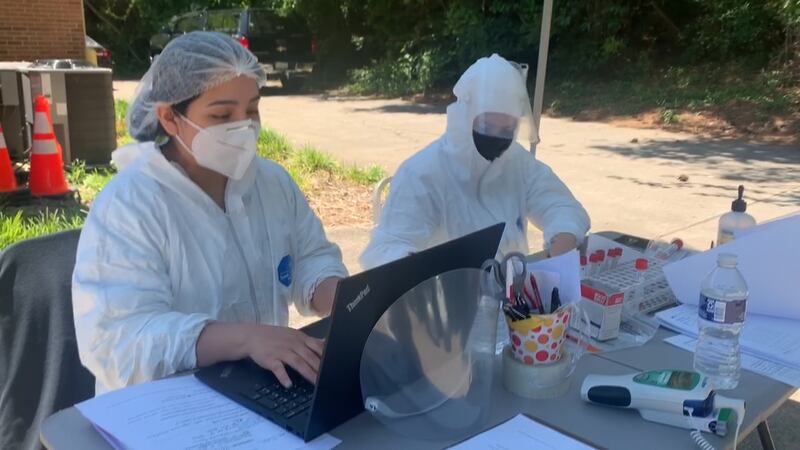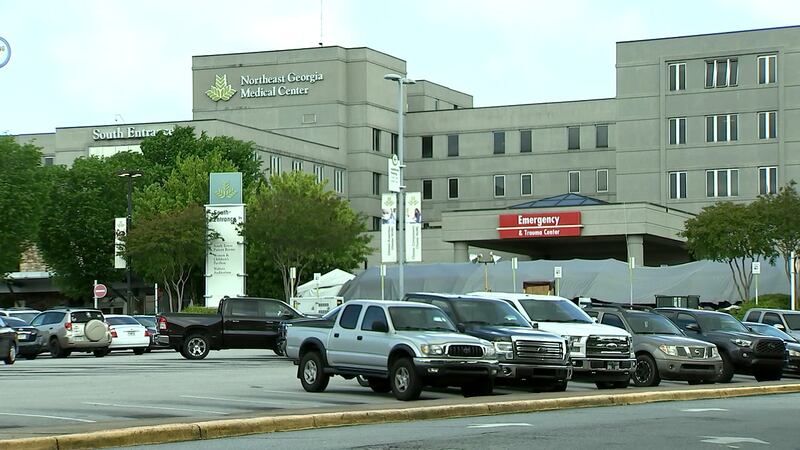HALL COUNTY, Ga. — More and more people are getting out as coronavirus restrictions are eased across the state, but there is still one area in north Georgia where the virus is getting worse and worse.
So far, COVID-19 has killed 1,044 Georgians.
One of the hot spots that remain in Georgia is in Hall County, where there are more than 2,000 confirmed cases of COVID-19.
Channel 2’s Michael Seiden has learned many of those cases come from essential workers, and Latinos account for about half the positive cases in Hall County.
Channel 2 Action News has confirmed many of the people who have tested positive for the virus work at poultry plants in Gainesville.
The companies say they have provided personal protective equipment for the workers, but that still hasn't stopped the spread of the virus. What makes matters even worse is many of the people getting infected are their family's only source of income.
At Murray Medical and Wellness Center, the demand to get tested for COVID-19 has gotten so high that doctors are no longer seeing patients. Instead, it's all hands on deck.
Even office manager Patty Delgado gets suited up from head to toe.
Monday, she sent Seiden photos and videos from a testing site in Oakwood, where she was on pace to swab 40 people by the end of the day.
"In one morning, half a day, I've already seen as many people as I saw in one day last week," Delgado said.
Hall County has already seen 29 deaths and more than 2,000 confirmed cases, including Gainesville resident Angel Alfredo Rodriguez.
RELATED STORIES:
- Hospital in Gainesville bracing for peak of COVID-19 as hot spot forms in Hall County
- Coronavirus crisis: Gov. Brian Kemp tours hard-hit Albany, but also warns of new metro hot spot
- As parks, public spaces begin to reopen, some find conflicting rules over social distancing
His family said he tested positive for the virus April 2. Rodriguez is now in a coma fighting for his life.
“We don’t know where (he got it). What we do know is that he works in a poultry plant where my uncle was also infected, and my dad was infected. We think my dad infected my mom, my uncle infected my sister,” family member Yamilet Rodriguez said.
According to county and state leaders, Latinos appear to be the hardest hit community.
Delgado told Seiden that 99% of people she had tested are Latinos who work on production lines at poultry plants in Gainesville.
"Sometimes they ride with other people who are positive, and now they breathing close to each other," Delgado said.
With the peak in that area expected to hit in June, many leaders in the community are worried this current situation could turn even more dire.
“We’ve seen maximum, like 76 families per week, that need a food box dropped off at their doorstep by our volunteers,” said Vanessa Sarazua, executive director and founder of Hispanic Alliance Georgia.
More than a week ago, Sarazua and her team of volunteers hosted a food drive for underprivileged families impacted by the virus.
"There's that misconception that although we are in a crisis, they can't go and help and seek help at the hospital because it will show up as a public charge if they're in the process of an immigration status," Sarazua said.
The North Georgia Health System is also keeping a close eye on the situation.
"So the medical ICU branch was at 16 beds, now they have 50. We're at about 80% capacity right now," said Dr. Clifton Hastings with Northeast Georgia Medical Center.
Doctors and health care professionals are now working with a local task force to address the spread of the virus.
"As a result of that, we were able to allocate the appropriate resources into those areas, whether it's in the housing authority, an area where we can really community and target them," said Carol Burrell, president and CEO of Northeast Georgia Health System.
This is happening at a time when Georgia is continuing to ease restrictions.
That’s where IPC Global, an Alpharetta-based company specializing in data integration and analytics, believes it can play a key role in protecting the public.
Mark Meersman and his team worked together to develop an interactive online tool.
It combines Johns Hopkins University COVID-19 cases and deaths with the Centers for Disease Control and Prevention’s Social Vulnerability Index.
Meersman recently gave Channel 2 Action News exclusive access to the website, which allows you to click on all 159 counties in Georgia.
"If I was county leadership, I could use this certainly to suggest — and then as we look to reopen — you know what's happening differently in there," Meersman said.
Meersman said he would make the website public and hopes that would get the attention of the governor's office.
He told Seiden that he wants to help Georgia win this battle.
© 2020 Cox Media Group








